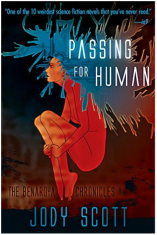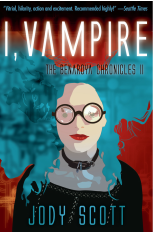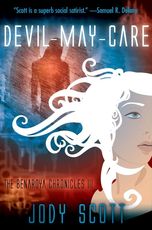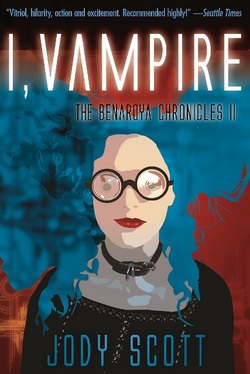 Sterling O’Blivion has been a vampire for 900 years, and has spent her life observing the evolution of a human race - and now works at a dance studio. Thankfully, she is not an obsessive, sulky vampire like those found in some of the more famous fantasy novels! Scott crafts a dry, witty protagonist, whose voice and observations concerning society and humanity will keep you captivated and more often than not, make you laugh or keep you deep in thought. Then one day, after becoming content with her modern life, O’Blivion meets Virginia Woolf - also known as Benaroya, an enthusiastic, bubbly alien that soon becomes O’Blivion’s lover, while they work together to defeat a rival alien threat, and start a business selling Famous Men’s Sperm. The plot in this novel is unlike one we’ve ever encountered before - it’s wild and complex, but intriguing and one that definitely keeps the book on your mind, even days after you finish it. Scott also creates fantastic characters that carry the story, and even when the plot gets complicated, Benaroya’s enthusiastic quips or Sterling’s witty and cutting thoughts will carry you through the more technical side of the plot, which can lose you at times. Thankfully, if you do get a bit lost, it won’t impact your enjoyment of the book, as the sci-fi elements don’t ultimately carry that much importance to the story or it’s overall message. Scott crafts an intriguing, funny, and extremely clever story that entertains, while also offering enlightening observations on elements of society. While the outlandish plot and age of the book might put some readers off, we wouldn’t let it stop you. Reading it is an experience that you will want to have, if only to see a vampire and Virginia Woolf try to set up a business to sell sperm to housewives! That, and it’s an extremely well written, witty and thoughtful novel to boot. BY CHLOE SMITH I, VAMPIRE / AUTHOR: JODY SCOTT / PUBLISHER: DIGITAL PARCHMENT SERVICES / RELEASE DATE: OUT NOW
0 Comments
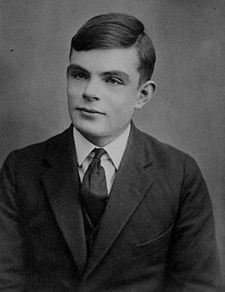 During World War II, UK mathematician Alan Turing is instrumental in cracking the German enigma code and helping shorten the war. After the war he pioneers computer science. In 1952 he is prosecuted for being homosexual and sentenced to "chemical castration." Two years later he commits suicide. Half a century later the British government apologizes and issues him a posthumous pardon. (The story of the film 'Imitation Game' which I recently watched.) About this and the innumerable similar cruelties perpetrated by a majority heterosexual culture against minority homosexual citizens part of me feels a righteous "you-straight-people-have-a-lot-to-answer-for" outrage. If I told my straight brother with whom I watched the film what I sometimes feel about straight people, I'm sure he would be slightly shocked. If the story of Alan Turing had taken a different twist, say for instance he'd become a spy for the Soviets (who would have surely told him- truthfully or not- that in USSR his sexual orientation did not matter), against a culture that criminalized his existence, I would have felt sympathy for his character. And if he'd gotten away with it, again part of me would've felt that was just. A balancing the scales as it were. In the April 6th New York Times I read an interview with actor Sterling K. Brown who plays prosecutor Christopher Darden in 'The People vs. O.J. Simpson' in which he talks about attitudes in the black community about O.J at the time of his trial, "Black people were very protective of O.J. Simpson... and the idea that another black man [Darden] could try to tear that man down was very, very much frowned upon."
A couple weeks earlier I'd seen a TV interview with Cuba Gooding Jr. who'd expressed his own similar sentiments from the time. I thought his comments mildly interesting but of no particular import. But putting these two interviews together, I was shocked. "Really?" I thought, "you mean large numbers of black people didn't care about O.J.'s guilt or innocence, they just wanted him to get off?" It seems unbelievable to me that anyone could believe such a passionately personal attack was committed by a stranger, but is my surprise in part the same as my brother's, that of the majority at the anger of the minority? Do my biases make Nicole Brown and Ron Goldman more real and important to me in the equation because they were white as I am? Do black folks' biases make O.J. more real and important in the equation because he is black? And let's not forget he was a sports star. I think the urge to want O.J. to get off had as much to do with hero worship of male athletes and the cult of celebrity as with race; black prosecutors prosecute black defendants all the time and aren't accused of being "Uncle Toms" for it as Darden was for prosecuting O.J. We are all comfortable with what's familiar. Whether we like it or hate it, we understand it. It is experientially much more real to us. That's what makes people able to inflict on "unlike-me's" cruelties that would shock them if applied to "like-me's." It's what makes majorities potentially so dangerous to minorities. So was the verdict in the O.J. trial jury nullification? A chance taken to give a big "fuck you" to a system that fucks over people of color? Did the jurors really believe the murders weren't committed by Simpson? Who knows? (I'm sure there are a million articles analyzing this; none of which I've read.) To explore your own biases you can take a variety of tests at www.projectimplicit.com. The result of the one I sampled before linking to the site, while not surprising, was none-the-less illuminating. -Mary Whealen 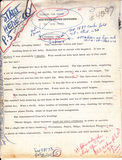 Jody had the extraordinary ability to talk to anyone, and no fear, no back off on doing so. A skill that came in very handy when it came to promoting her books. In 1977 when PASSING FOR HUMAN was published, there were no personal computers, no smart phones, no social media, no internet. It was typed on a typewriter and submitted on paper. If you wanted to do research you went to the library. If you wanted to promote your recently published book you hit the pavement and talked to people directly, at conventions, bookstores, university panels and local daytime talk shows. Jody did all of the above and more. When it came to direct, peer-to-peer promotion, of the kind we take for granted today on social media, her imagination was as wide-ranging and fearless as it was in her writing; she hired hot air balloons, an actor friend to dress up as a vampire and hand out fliers (for I, VAMPIRE, the sequel to PASSING), sent bookmarks to stores all across the country, made posters, brought books to conventions and sold them directly. All with a DIY, handmade aesthetic that managed to convey her trademark enthusiasm and humor, and sell books. -Mary Whealen “Sell, sell, sell,” I exhort the new teachers. “Put that pen in their hands! Get their signature on that line. Homo homini lupus!” quoting Dante, Cervantes, and Marcel Proust; giving pep talks, making charts, forcing them to compete with each other in a desperate frenzy; insisting that they spend every minute of their spare time collecting little bills and receipts for the IRS; or using their pocket calculator to figure capital gains breaks, health benefits, or retirement plans; or, if religious, quibbling with God; or, if not religious, polishing their teeth, curling their lashes, applying lacquer to their toenails, and preparing for wonderful, glossy dates with handsome closet cases who lift weights.
“This is the twentieth century,” I encourage them earnestly. “We must fill our time with these activities so we won’t ever need to think. If all else fails, stuff a Twinkie down your throat and go to a disco.” And I mean it. They don’t suffer the same guilt I suffer; but in a way, what they must endure is far worse. Yet I wonder. Where can it end? Perhaps I spend too many hours at the Studio. Between lessons we all mill around in libidinous frenzy, the women teachers and the men teachers and the students and myself, experiencing the same pulse of life that thrilled the poet Blake when he wrote the Songs of Innocence, or the painter Grünewald when he created his justly famous Isenheim Altarpiece. Everyone is in a mad rush, changing costume to a drumbeat in the back room, straining and complaining under the narcotic of ritual dancing, a skittery swampfire of thousand-year lost causes. Patsy Cox takes down her strapless and switches bras right there in the thick of battle, proclaiming, “Now I gotta boogaloo with Mr. Glumfa of the big feet and bad breath who steers for the dark corners. Faen! Helvete! Satan,” and other medieval curse words I’ve taught her. The male teachers all chatter at once: “Thinks she can dance and it’s torture, talk about bondage my dear, but she’s got megabucks and is generous. She likes me and I love hating myself,” At which the bell rings and we all jump out and begin gyrating like the demons in a painting by Hieronymus Bosch. Maybe I’m just jaded. I don’t know. The haunting seems to be getting worse. A bleed-through from other times? I don’t know. Still, the dance biz is so agonizing it satisfies at least part of my craving for punishment. At the first lesson you give your pupil a test to determine his dancing quotient, or D.Q. as we call it in the trade. This can be an enormously satisfying little exercise. You bounce him around to the music and you say, “Well, Mr. Zilch, you certainly have a lot of potential. I’m going to give you a D-minus for what you actually know about dancing, which isn’t much, but an A for your natural talent. Now tell me, do you think those are fair grades, darling?” What can he say? He gobbles it up like popcorn. The point is, Mr. Zilch doesn’t have a friend in the world, not really, or why else would he be here? We sell graded courses in the form of brass, silver, and gold certificates, depending upon how many dances the student wants to learn. We have clever parties to build up competition between our branch studios. It costs a fortune to run a studio. You can’t sit around trading baseball cards; you’ve got to compete; you’ve got to hustle in order to get ahead and stay ahead, and drown the funny things that are going through your mind. The big dances are exciting. We hire a band and fix the hall up with streamers, confetti, gleaming punch bowls, sometimes even horns and hats. Everyone is showing off and suddenly the loudspeaker roars: “STOP THE MUSIC! STOP THE MUSIC!” Then a hush falls. Nothing is heard but a few electronic crackles in the speaker itself. Then a deeply serious and important male voice (Johnny File’s, usually) proclaims, “Lays and gentlemen, your attention please! Mr. B.J. Washout, whom most of you are lucky enough to know in person, has just signed up for a lifetime course of dance lessons. Come up and say a few words, Mr. Washout!” The spotlights search frantically, locate B.J. Washout, and follow his silver head bobbing its way to the podium on a long drumroll. Suddenly it’s Born-Again time. A fervid silence falls. Mr. Washout, torn with emotion, staggers to the microphone, clutches it in his sweating hands, takes out his handkerchief and blows his nose, absolutely overcome, and finally gets the words out. “Yes! Yes! Miss Krantz has just signed me up for a lifetime course of dance lessons.” Pandemonium. Cheers, applause, horns are tooted, streamers thrown. Mr. Washout raises his arms for silence (we must not forget that this is the high point of his entire life) and continues: “I spent my retirement savings, every last penny—” Tremendous cheers. A honk, as Mr. Washout blows his nose onto the monogrammed hanky which he then carefully stuffs into his pocket and goes on, “I’m so happy! So happy.” (A long sigh from the audience, followed by scattered applause.) “I wish every one of you could sign up for a lifetime course. I wish the whole world could come to Max Arkoff and be as happy as I am!” They help him off the stage. They leave him sobbing in a corner with his radiant teacher, who has just made a nice amount of money, depending on her contract. It is the dance of life!, the mighty hunters cornering a woolly mammoth at cliff’s edge. It is Cro-Magnon doing his brilliant wipeout job on poor dumb Neanderthal! But it takes my mind off a rush of giddiness, when for a moment I seem to be back in my beautiful Sibiu with its deer park and its vineyards, and golden sunsets, the air scented with apples and wood smoke… Something is happening to me. I hear Johnny’s voice. “STOP THE MUSIC! STOP THE MUSIC! Lays and jelman, the senior Mrs. Nussbaum who is 82 years young” (applause, whistles, cheers) “has just signed up for 40 full years of dance lessons! Let this be an example of optimism to everyone here, because she sold her iron lung to do it!” And Mrs. Nussbaum totters up gasping for air, gesticulates violently, and goes into convulsions, but the audience thinks this is some new dance step, and they applaud wildly. (read more I, Vampire at reviews.) |
Get blog via email or reader:Categories
All
Archives
June 2022
|


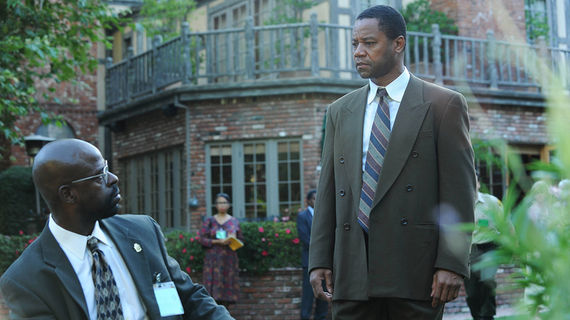

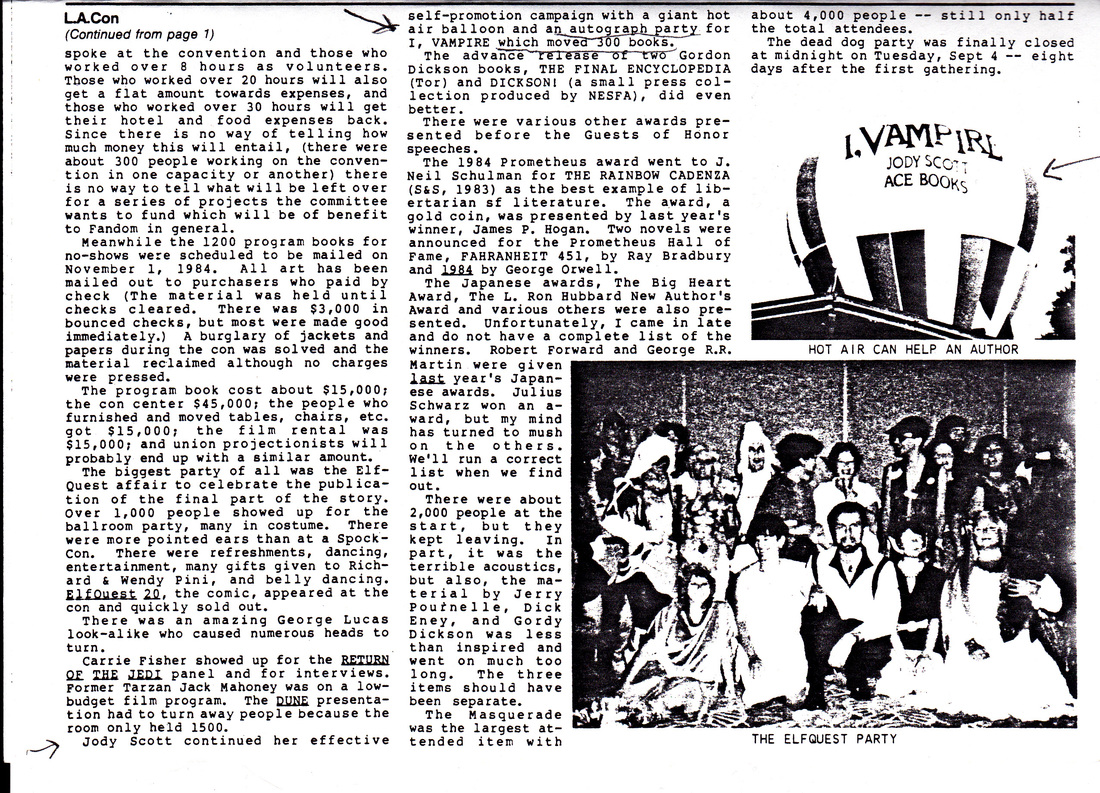
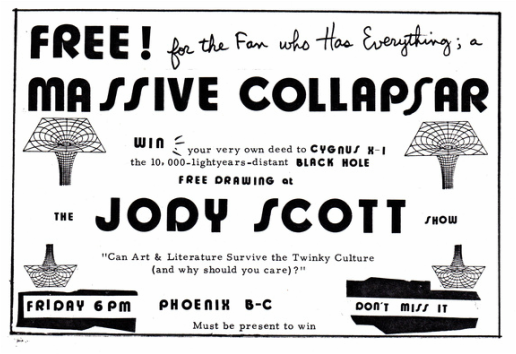

 RSS Feed
RSS Feed

